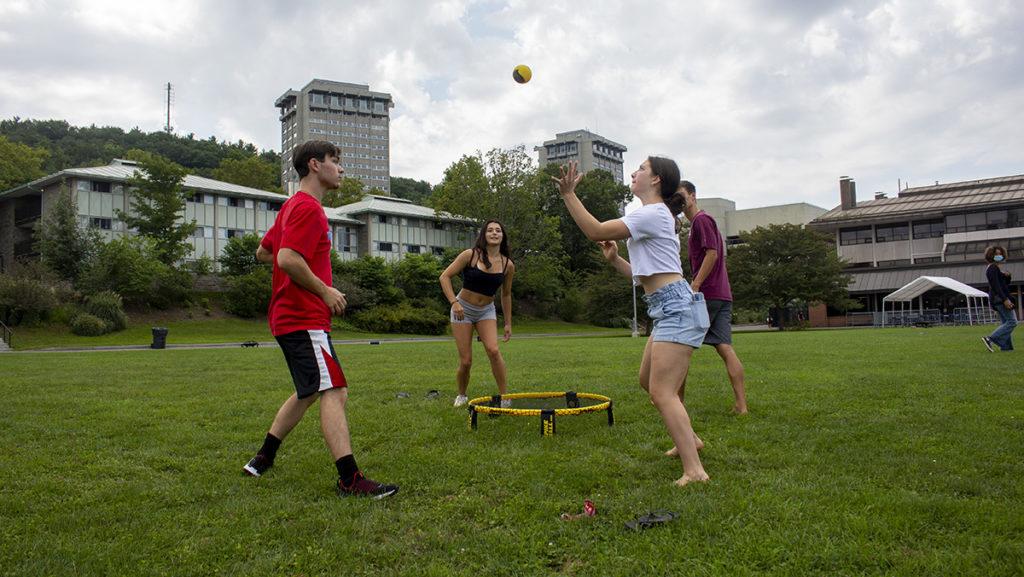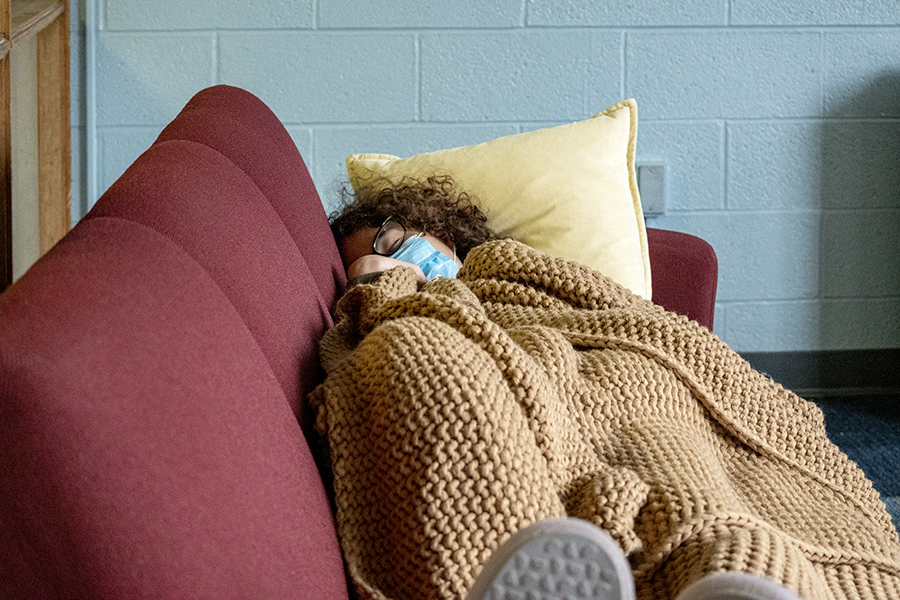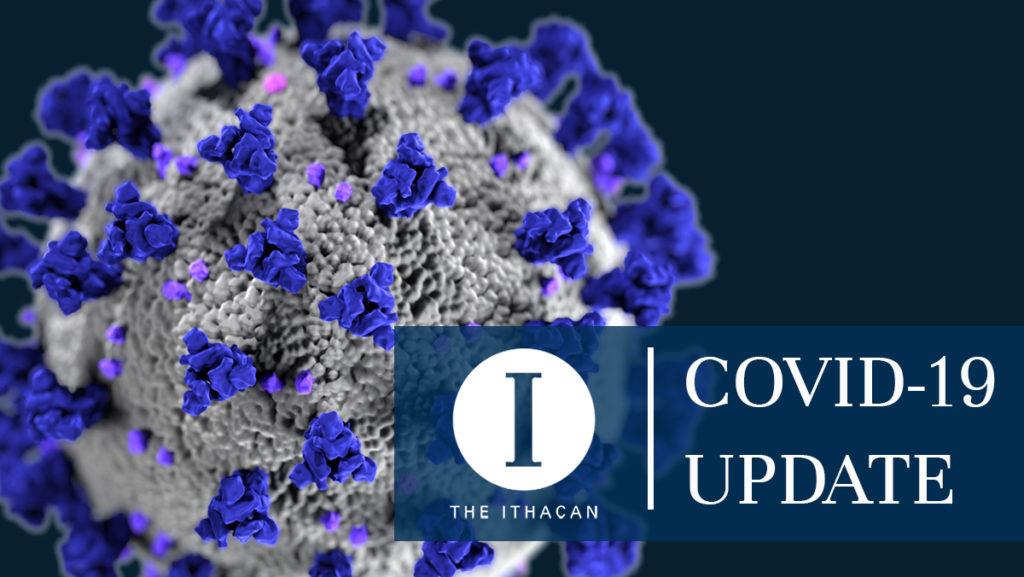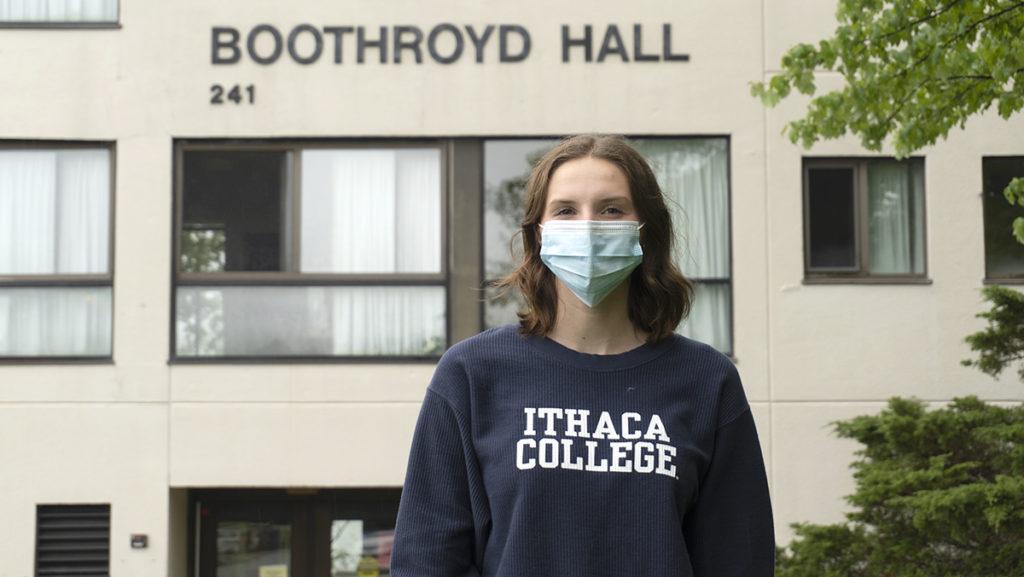Ithaca College has gradually returned to in-person classes and normal dining services, but reinstated mask wearing indoors for Fall 2021, sparking controversy among some students.
The college began welcoming students and faculty back to campus Aug. 10 for the fall semester and for in-person classes with few health and safety guidelines still in place. In order to return to campus, all students were required to be fully vaccinated for COVID-19. Excluding medical and religious exemptions, 99% of the student population is fully vaccinated against COVID-19. Faculty and staff are not required to be vaccinated.
In a July 30 email to the campus community, the college said mask wearing is required indoors for all individuals, regardless of vaccination status.The college had previously relaxed its mask policy for those who submitted proof of vaccination in July.
Cornell University moved to alert level yellow, which means there is low to moderate risk of transmission, Aug. 27 following two days of in-person classes. Any Cornell students, faculty or staff who have not been vaccinated are required to participate in surveillance testing.
Ithaca College is currently at alert level green. Students, faculty and staff at the college are only required to participate in surveillance testing if they are not fully vaccinated. The college currently has eight active student cases and five active employee cases.
Any student who is vaccinated and experiencing symptoms can go to the Hammond Health Center for a COVID-19 test, Samm Swarts, assistant director of Emergency Preparedness and Response in the Office of Public Safety and Emergency Management, said via email. Employees who are vaccinated and experiencing symptoms should look for testing at the mall site or through their regular healthcare provider, he said via email.
In light of the spread of the delta variant, a more contagious strain of COVID-19, some universities like the University of Texas at San Antonio and California State University at Stanislaus, have decided to delay in-person classes, according to an article from the Chronicle of Higher Education, written by reporting fellow Oyin Adedoyin.
“We saw kind of a disagreement between public health officials and experts and some state governments,” Adeyodin said in an interview with The Ithacan. “We saw a lot of associations call on states to kind of back down on some of those restrictions and let colleges and universities kind of use the data that they’ve gathered over the past year plus to enforce some of those public health measurements that are including masking and vaccination.”
Mask Reaction
Students have expressed a variety of responses to the college’s decision to reinstate its indoor mask policy for the fall semester.
“We anticipated a mixed reaction,” Swarts said via email. “Overall, the response has been mostly positive.”
Tompkins County is currently experiencing a drastic increase in COVID-19 cases. There were 30 new positives Aug. 30 and a total of 253 active cases. Active cases rose above 100 for the first time since April on Aug. 13. The last time the county had more than 200 active cases was between December 2020 and February 2021. Many Ithaca College students took to Twitter to express their dissatisfaction with the college’s lack of surveillance testing for vaccinated students.
Barstool Ithaca posted July 30 following the email update asking students what they felt about the policy. The post received 73 comments from students expressing why the college should or should not require masks.
Junior Meredith Robbins commented, “Getting to take off your mask as a ‘reward’ for getting vaccinated was/is not the point.” She said in an interview with The Ithacan that she was not surprised about the college’s decision given the delta variant.
“Why would I want to get COVID?” she said. “Even if it’s not that bad, it still means I have to quarantine, still means I’m at risk for these long-term effects that I don’t know. I don’t want to experience that, I don’t want to take the gamble.”
Junior Carter Clover also commented on the post, “But like what if I don’t wear a mask. And what if you don’t too. And maybe it’s like a trend and everyone won’t wear one. I think it’s a pretty cool trend ngl [sic].”
He said part of wearing a mask is a freedom issue to him.
“Obviously I’m going to Ithaca, I’m going to follow the rules, but at the same time I have an issue with my personal liberties being taken,” Clover said in an interview. “I know people say it’s just a mask, but you’re also just telling people what they can and can’t do and sometimes people don’t understand that.”
Clover said he had COVID-19 in September 2020, but did not experience any serious symptoms or side effects.
“For me, part of my arrogance is that it never hurt me,” he said. “I just feel like I’m more immune to it and I could handle it more than, say, someone in their 40s or 50s.”
As of Aug. 25, there have been 2,761 deaths from COVID-19 in people ages 18 to 29, according to the Centers for Disease Control and Prevention (CDC)
Senior Miranda Lape commented, “As a vaccinated person, I think of it as my responsibility to protect young children … and immunocompromised folk and other folk who can’t get the vaccine for valid reasons.”
Lape said she understands why students are disappointed, but would urge the campus community to think of the bigger picture.
“I feel like it doesn’t take a lot of effort and it doesn’t cause any harm to individuals to wear a mask and it helps a lot more than people may initially think or realize,” she said.
Senior Ronan Mayock was an orientation leader who welcomed the Class of 2025 to the college Aug. 16-17. He said approximately 90% of new students wore their masks properly during orientation, and that he thinks the mask policy indoors is not a big deal.
“It’s really not that bad,” Mayock said. “Like people, just follow the rules, it’s so easy. I wish people would just, you know, help us all out.
Return to Normal
While the college has mostly returned to normal, there are still some guidelines in place to help keep the campus safe like the daily health screenings. Swarts said the community agreement, which students had to sign agreeing that they will follow all of the college’s policies, guidelines and expectations in regard to COVID-19, is also still in place for the fall semester.
Dining halls on campus are back to full capacity with no social distancing requirements in line or while eating at tables. During Spring 2021, lines in the dining halls were socially distanced, some dining stations were closed and food was only served in reusable takeout containers.
Scott McWilliams, director of Dining Services, and Reginald Briggs, associate director of Dining Services, said dining halls are functioning normally again.
“We’re just excited to open up things a little more and have seating in the dining spaces and be able to provide a little better service and experience for all the students,” Briggs said.
Senior Madelynn Thompson said she feels safe wearing a mask, but she is a little nervous about dining.
“I guess another biggest concern is like the dining hall, because at the dining hall everyone’s masks are down, you’re eating food,” she said.
Coffee shops and cafes on campus are set to open after Sept. 6 after being closed for the spring semester because of social distancing requirements, McWilliams said.
However, Terrace Dining Hall will be closed for breakfast from Aug. 30 to Sept. 12, according to an Intercom announcement.
McWilliams said this is a very temporary change due to short staffing.
“This was decided at the end of last week when we knew we had to reallocate staff due to shortages,” said McWilliams via email. “Currently the Express Cafe is a temporary solution.”
Briggs said it is still unknown if the library café will open and if students will be able to eat and drink inside. Briggs said reopening is happening in phases because dining services is struggling with staffing levels, a current national problem in service industries.
McWilliams said a goal of dining services is to implement cameras in the Campus Center Dining Hall around mid-September so that students, faculty and staff can look online and see how long the lines are at the dining halls.
Mayock said he is elated to have both classes and dining return to normal for the fall semester.
“I am super happy that, even if it’s not all the way back yet, it’s as close as it can get for now,” he said.
Contributing writer Olivia Stanzl contributed reporting.











